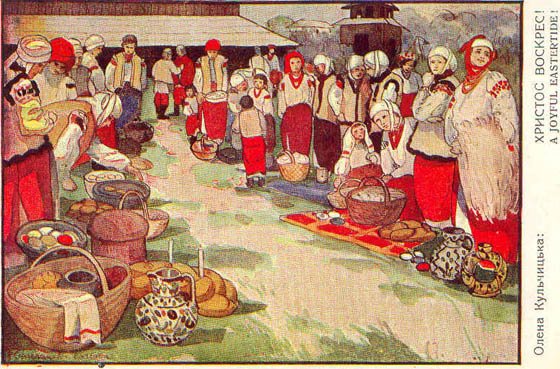
Easter Food Basket
It is traditional that during the Great Fast (Lent), the faithful fast and abstain from meat and dairy products as much as possible. To show their joy and gratitude at the end of this time of fasting, people take to Church baskets of food which are to be blessed and then consumed on Easter morning to “break-fast”. The traditional Ukrainian Easter morning breakfast of hard-boiled eggs, various meats, sausages and ham, butter, decorative paska, salt, horseradish, and cheese is a very special treat. This meal is very much looked forward to, especially in light of the symbolism of the foods that are consumed. In the Ukrainian tradition, the Easter basket foods symbolize:
- Paska — Christ, Our Bread of Life
- Eggs — New Life and the Resurrection of Christ
- Horseradish — The Passion of Christ
- Bacon — God’s Mercy
- Cheese — the moderation that Christians should show in all things
- Salt — The duty of Christians to others
- Ham — The great Joy and abundance of Easter
- Butter — The Goodness of Christ
- Kielbasa — God’s Favor and Generosity
Easter was celebrated for three days
In Ukraine, Easter was celebrated for three days. There was usually no work done, much food consumed and many hours spent in church, as well as with family and friends. Being such a happy time, there were also stories told and games played by the children. Among the games was the rolling of the krashanky (plain colored, hard boiled eggs. single egg: “krashanka”, from the word “kraska”, meaning “color”).
There were many variations of that game. The one popular among the girls was the line rolling. In that, girls would stand in two parallel lines and roll the eggs back and forth between partners. The two girls with the last remaining un-cracked egg would win all of the eggs that had cracked. Another game with krashanky was known as “chockamia”. In this game, two children would tap each others eggs together until one of the eggs cracked. The winner, whose egg did not crack, got to keep the cracked egg. Older children would do the airborne variation of the parallel line game. The eggs would be thrown between the teenagers in the lines. Again, the team with the last un-cracked egg would be the winner.
Pysanka
Arguably one of Ukraine’s most famous Easter traditions is their intricately decorated Easter eggs known as ‘pysanka’. The word pysanka comes from the verb pysaty, “to write”. Creating pysanka is an extremely complicated endeavor and they are usually created during the last week of Lent. The smoothest and best-shaped eggs are used to make pysanka. A stylus is often used to ensure and perfect the clean lines and intricate patterns on the eggs. Pysanka are given to friends and loved ones to represent the gift of life, and are usually decorated to match the personality of the receiver.
One of the most popular; and oldest, pysanky legends tells of a young woman who was on her way home from the market in town. She had with her a jug of fresh water for her journey and a basket of eggs. On her way she met a stranger sitting on a rock. Thinking he must be a tired traveler, she offered him a drink of her water. When he handed the water back to her, she was surprised to see that he had wounds on his hands. The stranger said nothing, but got up and went in the opposite direction of the young woman. When she arrived home, she uncovered her basket and discovered her eggs had been turned into beautiful pysanky The stranger, of course, had been Jesus Christ, and that was the first Easter morning.
Paska
Paska is beautifully decorated Ukrainian Easter bread. Tradition states that the baker must keep their thoughts pure and the entire household quiet in order to ensure the bread bakes properly and becomes its fluffiest. This means that no one, not even neighbours or friends are allowed to enter the home during its baking! The intricate décor on the bread represents welcoming imagery of springtime. Some Ukrainian traditions insist upon three loafs: one to honour nature, another to honour the dead and a third to honour those on earth.


Comments powered by CComment